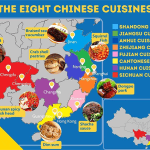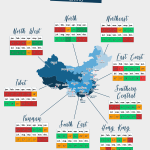The tourism industry in China is experiencing rapid growth, leading to the emergence of various hotels across the country. Finding suitable accommodation according to your budget is now easier than ever. However, it is important to note that foreign travelers can only stay in hotels that are licensed to accommodate them. While most hotels theoretically have this license due to the increasing number of foreign tourists visiting China, there is still a possibility that some smaller inns may not be qualified. It is recommended to verify this information before making a reservation.
China offers a wide range of accommodation options for foreign tourists, ranging from luxurious hotels to budget-friendly options, vacation resorts, youth hostels, and home inns. The country’s hotel industry utilizes a Star Rating System to assess the facilities, scale, service quality, and management of each hotel. The ratings range from 1-star to 5-star, with the latter category further divided into normal 5-star and Platinum 5-star ratings, representing the highest standard in the system. However, it is important to note that the star rating may not always accurately reflect the quality of a hotel. For example, a 5-star hotel in a major city may offer a better accommodation environment than a 5-star hotel in a smaller city, or a 4-star hotel may provide similar service and facilities to a 5-star hotel. For travelers with high accommodation standards, it is advisable to read hotel reviews before booking. Generally, international hotels and those rated above 3-stars are considered safer choices.
International Hotel Groups in China
With the rapid development of China, numerous international hotel groups have expanded their businesses to the country. Some of the well-known groups include InterContinental, Cendant, Marriott, Accor, Hilton, Starwood, Hyatt, Best Western, Kempinski, Four Seasons, Shangri-La, and Mandarin Oriental. Each hotel group offers various brands tailored to different markets and target customers.
In major cities such as Beijing, Shanghai, Hong Kong, Guangzhou, Shenzhen, Tianjin, Nanjing, Hangzhou, Chengdu, Xian, and Chongqing, a wide range of international hotel brands can be found. These include luxury hotels like St. Regis, Luxury Collection, Ritz-Carlton, Waldorf, Conrad Hilton, Peninsula, Park Hyatt, and Shangri-La; upper upscale hotels like W Hotels, JW Marriott, Westin, Grand Hyatt, and InterContinental; upscale hotels like Sheraton, Hilton, Indigo, and Crown Plaza; and upper midscale and midscale hotels like Four Points, Hilton Garden Inn, Hyatt Place, Holiday Inn, and Ibis. Beijing, Shanghai, and Hong Kong boast the highest number of luxury hotels in China due to their status as economic centers.
In smaller cities and popular remote tourist sites such as Jiuzhaigou, upscale and midscale hotels are also readily available. Generally, the distribution of international hotels in China follows the pattern of economic development: eastern cities have more international hotels than western cities, provincial cities have more than second-tier or third-tier cities, and tourist areas have more than non-tourist areas. In terms of hotel rates and facilities, smaller cities and remote tourist sites may charge less than big cities and may not offer facilities as luxurious as those in big cities.
Accommodation Categories in China
China offers a diverse range of accommodations, catering to every traveler’s needs and preferences. From budget-friendly 1-star hotels to luxurious 5-star establishments, as well as internationally renowned chains and cozy family inns, there is something for everyone. One convenient method of categorizing these accommodations is by their rates.
Expensive Hotels
Typically, hotels that fall within the 4-star and luxury categories are considered to be in this range. These hotels are known for providing top-notch amenities such as restaurants, bars, swimming pools, health clubs, and spas. Additionally, they often employ English-speaking staff, making it convenient for international travelers. The hotels in this category are quite similar, offering excellent service and a wide range of facilities. Travelers can choose a hotel based on factors such as location, rates, and personal preferences.
While some luxury hotels in major cities may charge upwards of ¥3000, the majority of them fall below ¥2000. By booking in advance, travelers can take advantage of great deals and discounts.
Mid-Range Hotels
Typically, hotels with less than 3 stars fall into this category. In China, there is a high demand for hotels in this range due to the large market. These hotels offer affordable prices with decent amenities such as a basic room with a private bathroom, air conditioning, TV, and some even have a restaurant. They are a popular choice for budget-conscious travelers looking for a comfortable place to stay. However, it can be challenging to find staff who speak English fluently at these hotels, unless you are in a tourist destination like Yangshuo in Guilin. Some youth hostels also fall into this category. Nowadays, many youth hostels offer unique services and modern facilities that showcase local culture. One well-known Chinese hotel chain in this category is Jinjiang Inn, which offers clean and comfortable accommodations at a reasonable price.
Budget Hotels
Many youth hostels and family inns fall into this category. These accommodations offer a variety of options for travelers. You can choose between a private room with a bathroom or a single bed in a shared room where you will need to use a communal bathroom. Typically, individuals sharing a room will be of the same gender, but in cases where there is a shortage of beds, travelers may be required to share a room with someone of the opposite sex. Despite the affordable rates, the greatest advantage of staying in these hostels is the opportunity to meet and connect with other travelers, enhancing the overall travel experience.
It is important to note that most youth hostels provide safe boxes for travelers to securely store their valuables. Be sure to lock up your belongings when you leave the premises.
Booking
It is highly recommended to make hotel reservations in advance, especially during peak tourism seasons such as the first week of May, October, various festivals, and summer vacation (July to August). Booking in advance may also lead to discounted prices. Travelers have the option to book a hotel either by phone or online. In cases where the hotel staff does not speak English, it is advisable to seek assistance from a local individual to make the reservation or utilize travel agencies that offer this service. Most hotels allow free cancellation of orders, but it is important to review the specific policies of the hotel you choose to book with.
Check in & Check out
Check-in time is typically after 14:00, and check-out time is around midday the following day. Some hotels may allow check-in as early as 13:00 or as late as 15:00, depending on the information provided on the booking website or the hotel’s official website.
Foreign travelers are required to present their passport and complete a registration form upon check-in. Additionally, tourists will be asked to pay a refundable deposit upon check-in, which will be returned upon check-out provided there is no damage or loss to the room.
Tips:
1. Laundry Services
Most luxury hotels offer laundry services for their guests. Alternatively, travelers can find laundry facilities outside of the hotel, which may be more cost-effective but less convenient than using the hotel’s services. It is important to consider your specific needs and preferences when choosing where to do your laundry.
2. Traveling with Children
Many hotels allow children under 12 years old to stay in their parents’ room for free, but policies vary among different establishments. Some hotels may have age restrictions or charge extra fees for additional beds. It is recommended to carefully review the hotel’s policies regarding children when making a reservation.
3. Accommodation in Remote and Minority Areas
Luxury accommodations are scarce in remote and minority areas such as Tibet and Xinjiang. In city centers like Lhasa, travelers can easily find comfortable and well-equipped accommodations, such as Sheraton hotels. However, in extremely remote areas, accommodations may be more basic. Despite this, these hotels often showcase local architectural styles and cultural features, providing a unique and authentic experience for guests.





















 Online | Privacy policy
Online | Privacy policy